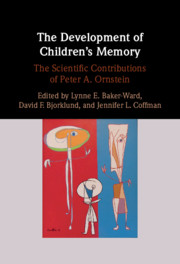Book contents
- The Development of Children’s Memory
- The Development of Children’s Memory
- Copyright page
- Dedication
- Contents
- Figures
- Tables
- Contributors
- Part I Backdrop
- Part II Children’s Memory Strategies
- Part III Children’s Event Memory
- Chapter 7 Children’s Reports of Personal Experiences
- 1Chapter 8 Children’s Memory for Instances of Repeated Events
- Chapter 9 Everyday Conversations as a Source of False Memories in Children
- Chapter 10 Commentary
- Part IV Family Socialization of Memory
- Part V Classroom Socialization of Memory
- Part VI Perspective
- References
- Index
Chapter 7 - Children’s Reports of Personal Experiences
From the Laboratory to the Doctor’s Office to the Courtroom
from Part III - Children’s Event Memory
Published online by Cambridge University Press: 28 May 2021
- The Development of Children’s Memory
- The Development of Children’s Memory
- Copyright page
- Dedication
- Contents
- Figures
- Tables
- Contributors
- Part I Backdrop
- Part II Children’s Memory Strategies
- Part III Children’s Event Memory
- Chapter 7 Children’s Reports of Personal Experiences
- 1Chapter 8 Children’s Memory for Instances of Repeated Events
- Chapter 9 Everyday Conversations as a Source of False Memories in Children
- Chapter 10 Commentary
- Part IV Family Socialization of Memory
- Part V Classroom Socialization of Memory
- Part VI Perspective
- References
- Index
Summary
Responding to a controversy regarding young witnesses’ legal testimony in cases of child abuse, Professor Ornstein implemented a program of research designed to inform the assessment of children’s reports of forensically relevant events. This chapter provides an overview of this extensive work. Following a discussion of the extant scientific and societal contexts, we examine the research paradigm that enabled Ornstein and his colleagues to investigate ethically children’s reports of real-world, sometimes stressful experiences under conditions of experimental control. Next, we describe differences in the event reports provided by children between the ages of 3 and 7 as documented in this research, and explore the underlying explanations for these differences. We continue with an examination of the contributions of Ornstein and his colleagues for obtaining and evaluating children’s eyewitness testimony, and discuss some continuing challenges for understanding children’s memory for salient experiences.
- Type
- Chapter
- Information
- The Development of Children's MemoryThe Scientific Contributions of Peter A. Ornstein, pp. 93 - 114Publisher: Cambridge University PressPrint publication year: 2021

